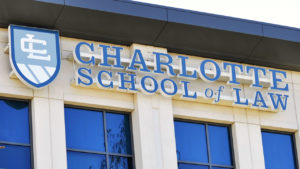 Charlotte’s only law school, Charlotte School of Law, closed in August 2017. The news followed multiple years of low bar passage rates and prior disciplinary actions from regulatory authorities, such as probation from the American Bar Association (“ABA”) and revocation of federally funded student loans. Even after closing its doors, Charlotte School of Law remains in the headlines in 2018.
Charlotte’s only law school, Charlotte School of Law, closed in August 2017. The news followed multiple years of low bar passage rates and prior disciplinary actions from regulatory authorities, such as probation from the American Bar Association (“ABA”) and revocation of federally funded student loans. Even after closing its doors, Charlotte School of Law remains in the headlines in 2018.
Charlotte School of Law is entangled in a number of class action lawsuits with former students who allege the school misrepresented its ABA accreditation status and bar passage rates. Additionally, former faculty members filed a lawsuit against the school for purportedly defrauding taxpayers by manipulating records to increase enrollment and profits. Charlotte School of Law now has the burden of defending multiple lawsuits by hundreds of plaintiffs in both state and federal court.
To complicate matters further, Charlotte School of Law and its parent company, InfiLaw Corporation, filed a lawsuit in federal court against the ABA on May 15, 2018. The lawsuit alleges the ABA’s accreditation standards are excessively vague. Charlotte School of Law further claims the ABA violated its due process rights when using these vague accreditation standards to determine the institution’s ABA accreditation status.
This lawsuit follows similar actions filed by the Thomas Cooley School of Law and Florida Coastal School of Law. Thomas Cooley School of Law’s action resulted in an undisclosed settlement agreement and, subsequently, the ABA restored Thomas Cooley School of Law’s standing as a fully accredited law school. Florida Coastal School of Law recently filed its lawsuit on May 10, 2018 and the litigation is ongoing.
Only time will tell if Charlotte School of Law can regain its status as an ABA accredited law school. However, even if Charlotte School of Law is successful in its action against the ABA, the law school must still resolve the lawsuits filed by former students and faculty.



